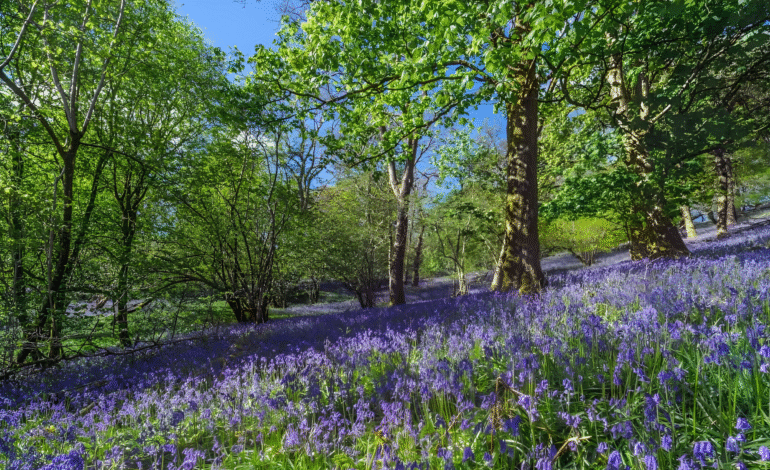Nature and Wellness: The Science Behind the Bloom
Experts have long emphasized the benefits of connecting with nature for both mental and physical health. Backed by modern research in ecopsychology, studies show that even a short walk in a park or a visit to a blooming garden can:
-
Improve mood and concentration
-
Reduce blood pressure and cortisol levels
-
Foster empathy and inner peace
From the fresh scent of lilies to the soft sway of wisteria, spring flowers offer more than just beauty—they’re nature’s therapy.
1. Monet’s Garden, France: Where Art Meets Nature
Step into the heart of Impressionist beauty in Giverny, France. This serene village is home to Monet’s Garden, designed in 1883 by the iconic artist himself.
Why Visit in Spring?
-
Vibrant blooms of poppies, irises, and peonies
-
The famous lily pond and Japanese bridge surrounded by hanging wisteria
-
Peak bloom: April to June
-
Open annually from April 1 to November 1
Maintained by the Fondation Claude Monet, the garden feels like stepping into a real-life painting—a must-see for art lovers and nature seekers alike.
2. Keukenhof Gardens, Netherlands: The World’s Largest Tulip Paradise
Located just 40 km southwest of Amsterdam, Keukenhof is a top springtime destination in Europe. It hosts over 7 million flower bulbs across 32 hectares, offering a breathtaking visual experience.
What Makes Keukenhof Special?
-
Over 800 varieties of tulips
-
Stunning displays of daffodils, hyacinths, orchids, and lilies
-
Classic photo ops: tulips beneath Dutch windmills
-
Best time to visit: Mid-March to Mid-May
Check the official Keukenhof bloom calendar for the most up-to-date floral highlights before planning your visit.
3. Tuscany, Italy: Witness Poppy Season in the Rolling Hills
During spring in Tuscany, Italy’s countryside transforms into a vibrant canvas of red poppies blooming between vineyards and olive groves.
Top Spot: Val d’Orcia (UNESCO World Heritage Site)
-
Best viewed from April through May
-
Striking contrast between crimson poppies, golden meadows, and green cypress trees
-
Ideal for peaceful strolls, picnics, or mindfulness sessions
Tuscany in spring feels almost surreal—perfect for photography, nature therapy, and quiet reflection.
Floral Therapy: More Than Just a Visual Delight
The beauty of blooming flowers goes beyond aesthetics. According to ecopsychologists, interaction with floral environments can:
-
Reduce anxiety and heart rate
-
Increase mindfulness and focus
-
Improve sleep and overall emotional balance
Common Therapeutic Effects of Flowers:
-
Lavender & jasmine: Calming effects
-
Daffodils & poppies: Boost mood through vibrant colors
-
Wisteria: Promotes peaceful reflection
From curated gardens to wildflower fields, Europe’s spring landscapes act as natural wellness retreats.
Why Spring in Europe is Perfect for Flower Lovers
Europe’s diverse geography and climate allow for a staggered spring bloom:
-
Southern Europe (Italy, Spain): Flowers bloom as early as March
-
Central & Northern Europe (France, Netherlands): Peak bloom from April to May
This extended bloom season means visitors can explore multiple destinations over several months for different floral experiences.
Additionally, many European gardens come with rich historical and cultural backgrounds, making them more than just scenic spots—they’re living legacies.
Mindfulness in Bloom: Reconnect with the Present Moment
In today’s fast-paced digital world, spring gardens offer more than beauty—they provide a rare moment of calm.
Simple ways to practice mindfulness in nature:
-
Sit quietly by a lily pond and observe the ripples
-
Walk slowly through tulip-lined paths, noticing color and fragrance
-
Breathe deeply among poppies swaying in the Tuscan breeze
Nature’s rhythm reminds us to pause, breathe, and be present.
Travel Tips for Spring Flower Seekers
To make the most of your floral journey across Europe:
✅ Book early – Accommodations fill up quickly near popular gardens
✅ Check bloom calendars – Like those provided by Keukenhof
✅ Dress smart – Layered clothing and comfortable shoes are essential
✅ Bring essentials – A camera, water bottle, and maybe a sketchpad
✅ Travel responsibly – Don’t pick flowers or stray from marked paths
Final Thoughts: Nature’s Gift That Keeps Giving
Spring may be brief, but the joy of nature’s colors and calm stays with us long after the petals fall. Even if you can’t travel to Europe, consider:
-
Visiting a local botanical garden
-
Planting spring blooms in a window box
-
Taking a mindful walk in your neighborhood park
Every encounter with nature is a chance to reconnect—with yourself and the world around you.








